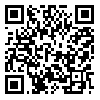Volume 6, Issue 2 (Journal of Anesthesiology and Pain 2015)
JAP 2015, 6(2): 11-20 |
Back to browse issues page
Download citation:
BibTeX | RIS | EndNote | Medlars | ProCite | Reference Manager | RefWorks
Send citation to:



BibTeX | RIS | EndNote | Medlars | ProCite | Reference Manager | RefWorks
Send citation to:
haghighi M, CHAVOSHI T, ghazanfar tehran S, khanjanian G, soleimani R, NEMATLLAHY M, et al . Effective factors in peripheral seizure production in patients undergoing Electroconvulsive Therapy from anesthesia perspective. JAP 2015; 6 (2) :11-20
URL: http://jap.iums.ac.ir/article-1-5204-en.html
URL: http://jap.iums.ac.ir/article-1-5204-en.html
Mohammad Haghighi1 
 , TAHEREH CHAVOSHI2
, TAHEREH CHAVOSHI2 
 , Samaneh Ghazanfar tehran2
, Samaneh Ghazanfar tehran2 
 , Gita Khanjanian2
, Gita Khanjanian2 
 , Robabeh Soleimani3
, Robabeh Soleimani3 
 , MONA NEMATLLAHY2
, MONA NEMATLLAHY2 
 , SAMIRA MIRZABABAE2
, SAMIRA MIRZABABAE2 
 , Batool Montazeri2
, Batool Montazeri2 


 , TAHEREH CHAVOSHI2
, TAHEREH CHAVOSHI2 
 , Samaneh Ghazanfar tehran2
, Samaneh Ghazanfar tehran2 
 , Gita Khanjanian2
, Gita Khanjanian2 
 , Robabeh Soleimani3
, Robabeh Soleimani3 
 , MONA NEMATLLAHY2
, MONA NEMATLLAHY2 
 , SAMIRA MIRZABABAE2
, SAMIRA MIRZABABAE2 
 , Batool Montazeri2
, Batool Montazeri2 

1- rasht/gums/arc , manesthesist@yahoo.com
2- rasht/gums/arc
3- GUMS
2- rasht/gums/arc
3- GUMS
Abstract: (6296 Views)
Aim and Background: Electroconvulsive therapy(ECT) is one of the most effective and prompt therapies for
severe psychotic issues. This study aims to distinguish the impact of age, disease and medications on the seizure
caused by ECT.
Methods and Materials: 123 patients were studied and categorized according to their age, psychotic disorder
and medications (anti-psychotics, anti-depressive or both of them). The correlation of these variants with seizure
duration were discussed in every session of ECT.The seizure duration was recorded based on clinical convulsion
and EEG parameters. The failure or success of ECT was evaluated by seizure time measurement to be less or
greater than 20 sec, respectively.
Findings: There was no significant difference observed between men and women in regards to the average
seizure duration in different sessions (6 sessions) (P=0.25).There was either no significant difference observed
in seizure duration in various sessions between patients under and above 40 years of age(P=0.45). Again
no significant difference was seen in seizure duration among patients with psychotic and mood disorders or
between patients using anti-psychotic or anti- psychotic and anti- depressant drugs for therapy, respectively
(P=0.38 and P=0.14).
Conclusions: Accurate knowledge about patients who are candidate to receive Electroconvulsive Therapy is
very important. Type of psychologic disorder, type of drug protocol and the number of sessions of ECT, all are
the factors which should be considered in every ECT procedure.
Keywords: Electroconvulsive therapy, seizure duration, success rate
Type of Study: Original |
Subject:
Special
Received: 2015.04.27 | Accepted: 2015.06.1 | Published: 2015.06.22
Received: 2015.04.27 | Accepted: 2015.06.1 | Published: 2015.06.22
Send email to the article author
| Rights and permissions | |
 |
This work is licensed under a Creative Commons Attribution-NonCommercial 4.0 International License. |



